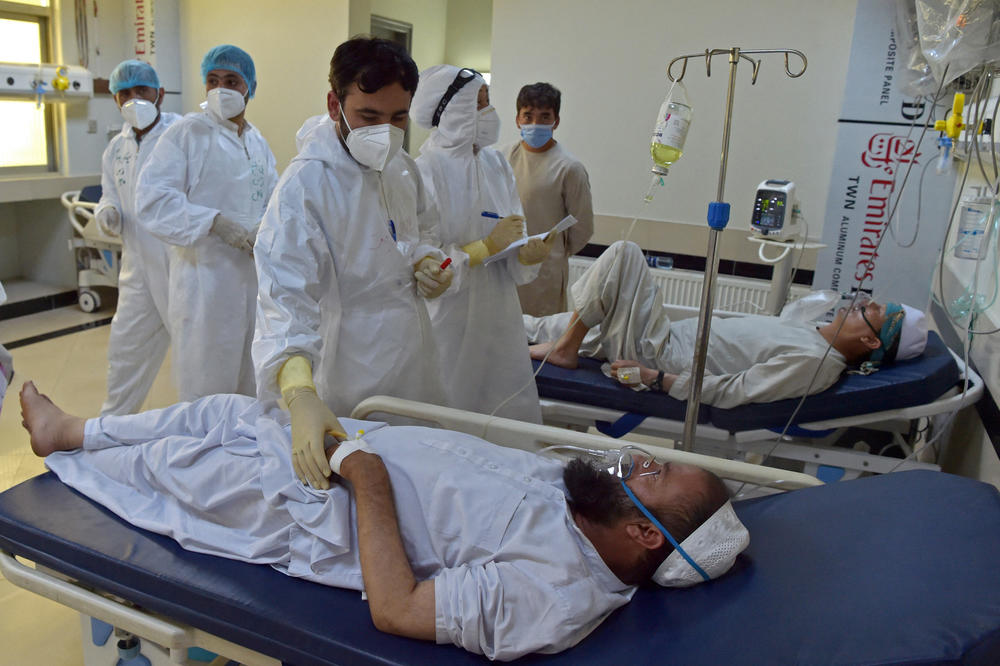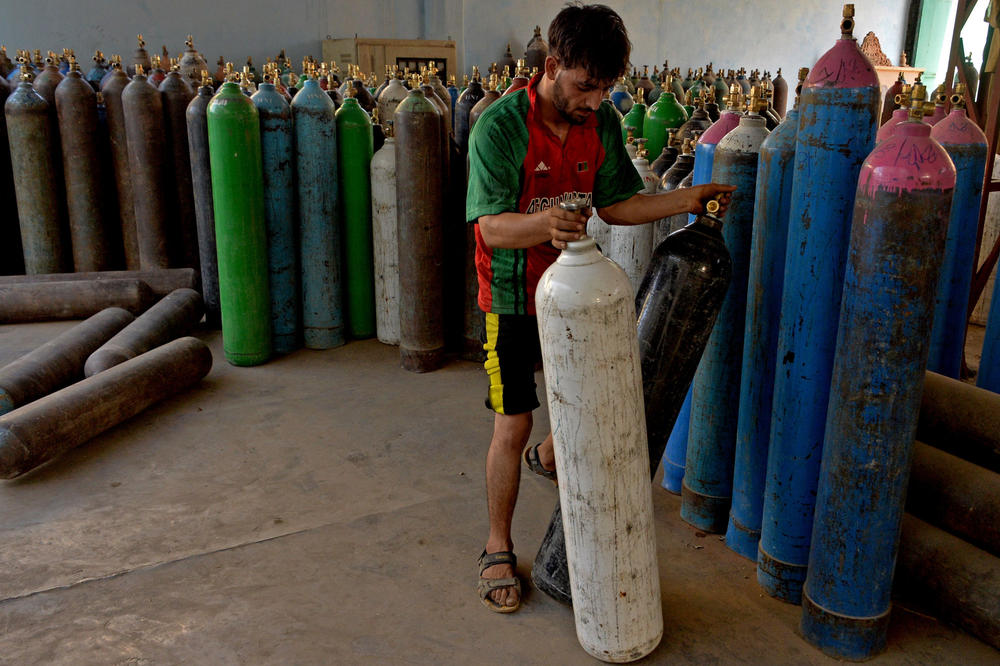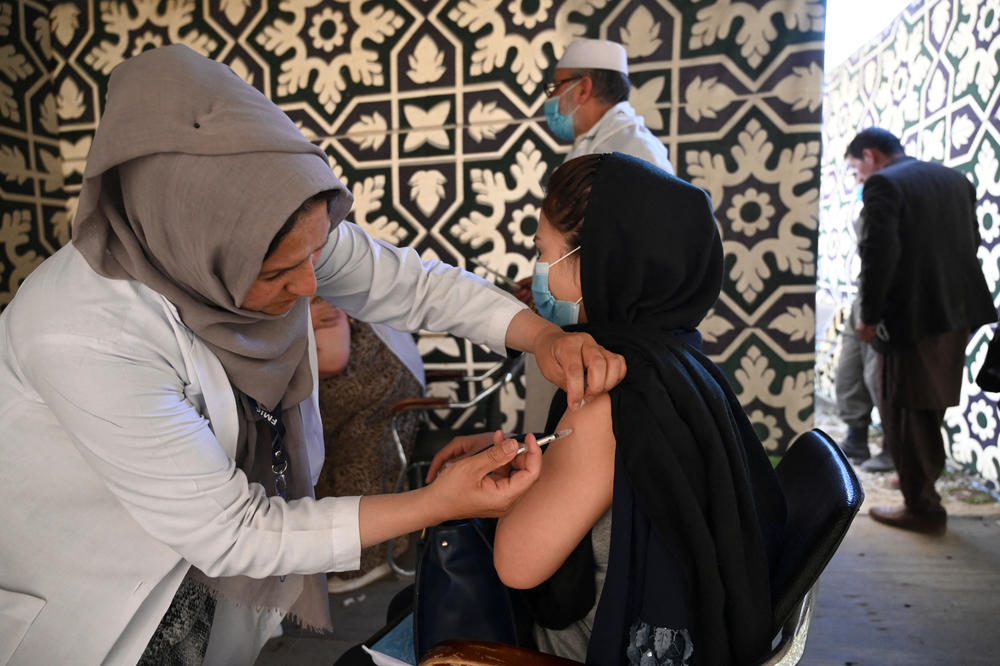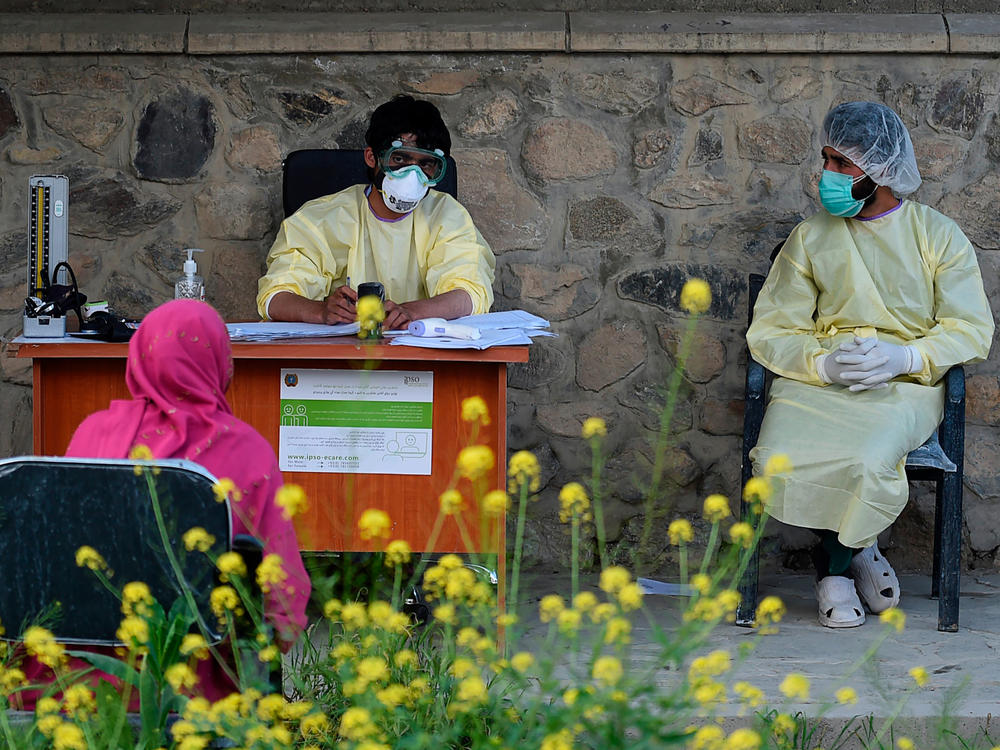Section Branding
Header Content
A Crippling 3rd Wave Of COVID Adds To Afghanistan's Woes
Primary Content
Few countries have been battered so violently as Afghanistan.
It has been roiled for decades by a war that is expected to escalate in coming months as foreign forces withdraw. There's deepening hunger and starvation. A severe drought is expected to displace hundreds of thousands as summer heat intensifies.
Then there's the pandemic.
In recent weeks, there's been an exponential rise in cases, even with limited testing. (The Ministry of Public Health reports there's just been over 500,000 tests since the start of the pandemic for a population of about 40 million.)
On June 16, there were 2,313 new cases, which the United Nations reports was "the highest number of new cases [in Afghanistan] recorded in a single day since the onset of the pandemic."
And the United Nations says that nearly half of all people being tested in recent weeks — 42% — are positive for the coronavirus, suggesting it is widespread.
But due to low testing rates and the lack of a national death register, "confirmed cases of and deaths from COVID-19 are likely to be underreported overall in Afghanistan," according to the United Nations.
It says there's a concern the highly contagious delta variant, which was first discovered in India, may be sweeping through the country. "May be" is key: The United Nations notes that Afghanistan "lacks in-country facilities to test for the variant."
But Dr. Tariq Akbari, medical director for one of Afghanistan's only hospitals dedicated to COVID-19, says many of his patients either returned from India or were in contact with somebody who did.
To get a sense of the extent of the crisis, NPR spoke to Akbari about the challenges in the institution he directs, the Afghan-Japan Hospital, and to Naqibullah Salarzai, vice president of the Afghan Red Crescent Society, which also runs a COVID-19 hospital in Kabul.
Hospitals are out of room for the influx of new patients
"We expanded our hospital from 120 beds to 150 beds in the third wave," Akbari says, referring to the current surge, which began about a month and a half ago. But at any one time the hospital now has more than 150 patients, "so we keep them in the corridor." The influx of patients "took us by surprise," he says.
Salarzai says he's seeing the same kind of influx.
"In our hospital, [cases have] actually increased very dramatically," he says. "We had only two patients three weeks ago. Now we have 36 people in our 50-bed hospital, and they all are in need of oxygen. Last night, 120 people came into the [outpatient department].
"It clearly says that the virus is spreading very, very rapidly. I am just afraid there will be another, another very bad and very ugly story, just like in Nepal and India."
Health workers are facing huge stresses
"My fiancée — now wife — came four weeks ago from Canada, and we got married here," Akbari says. "The next day I was in hospital. It's quite hectic and exhausting for me. I wake up at 6 a.m. and go to hospital, and go home [at] 11 p.m., 12.
"The death rate is high, because of a lack of equipment and a lack of oxygen. It's really hard to deal with as a doctor."
Hospitals are running out of everything
"It's not just ventilators," Akbari says. "We have only 25 CPAP devices — that's a device that helps the patient take oxygen regularly. Today in the hospital we have 78 critical patients. All of them need CPAP." They try to rotate the equipment to give as many patients as possible a chance.
There's a desperate need for aid
"One reason why we have been pushing for the international community to feel this sense of urgency is because people are literally dying," Salarzai says. "And if we even get the support later, I'm afraid it would be useless."
There are too many heartbreaking cases
"One lady, she was nine months' pregnant and COVID positive," Akbari recalls. "She had preeclampsia and high blood pressure, and I personally wanted to help with the management of this patient.
"But our hospital at the time did not even have a scalpel for a C-section. This COVID hospital is not multidisciplinary. I requested other hospitals take her, but everybody was afraid because she had COVID." So they wouldn't admit her nor would they come to the COVID-19 facility to manage her condition.
"She died, and her baby died. We were all crying. She was only 24 years old and recently married."
As in many countries, there's a vaccine gap
The United Nations reports that Afghanistan has received more than 1.6 million doses of COVID-19 vaccines. Nearly half a million came from the COVAX program, and half a million from India. In the most recent shipment on June 10, China sent some 700,000 doses.
But Akbari says it's definitely not enough to cover at least the people who are at higher risk and those who should be vaccinated.
Vaccine hesitancy has been a problem — but it's waning
Early in the pandemic, many in Afghanistan simply did not believe the coronavirus was real. When people died of COVID-19, some thought the government was killing them as part of a nefarious plot.
These sorts of conspiracy theories underscore the deep mistrust Afghans hold for their government.
"When I became medical director a year ago, I witnessed three incidents," Akbari says. "One person with a gun who wanted to shoot in the hospital; two brutal fights. They beat up our nurses and doctors over corona. They thought it wasn't real, that it was something the government was behind. That happened because of a lack of awareness."
But now, he says, there is an understanding among many Afghans that the pandemic is all too real.
Akbari says that at his hospital "we are seeing daily 200 people come in to get vaccinated. Now people are trusting us, now that they are witnessing this disease. But even my own family used to believe that COVID was just all propaganda; they didn't believe the disease was real. Now 99% of them are vaccinated."
Efforts to control the pandemic early on were hampered by people's unwillingness to admit they were sick
"In the very first wave, there was like a very serious stigma attached to [COVID-19], and people wouldn't even disclose it," Salarzai says. But now with so many cases, "people are more open about it," seeking health education as well as vaccinations.
The medical community wanted the government to take preventive measures against a third wave, but that mostly didn't happen
Hotels were open for wedding parties as the third wave began, and schools were open as well, Akbari says. "We were telling the government that the third wave might be very dangerous. We asked the government to shut down schools and colleges, shut down wedding halls; we asked them to build a 400-bed hospital and oxygen plant. Nobody listened to us."
But the government is now responding. On May 29, Afghanistan shut down schools and educational institutions in 16 provinces amid concerns of a growing wave. By June 16, all educational institutions were shut for the foreseeable future.
Social media are raising awareness — and causing anxiety among Afghans
"If I scroll on my [Facebook] news feed, [it] would be at least like more than 30[%], 40% funeral announcements or announcements about deaths of Facebook friends, relatives," Salarzai says.
"All those funeral announcements are due to COVID-19. People keep sharing the pictures and announcement of their relatives, their loved ones, their family members. So that has actually created a lot of panic."
Copyright 2021 NPR. To see more, visit https://www.npr.org.




